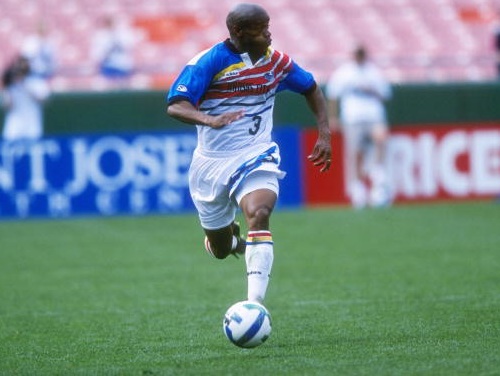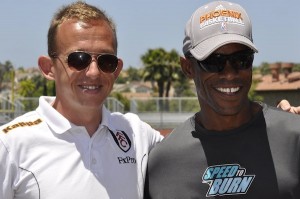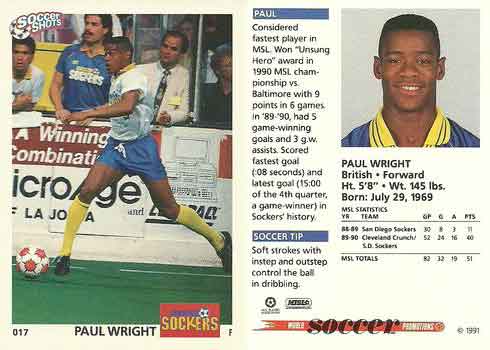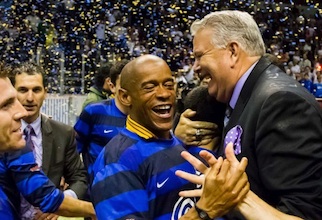Paul Wright Makes A Difference
Being a successful professional soccer player does not make you a good coach and there are many great coaches who never experienced success as a professional. However, should you find the combination of a great coach who has also been a successful player and set records — you may have found Paul Wright.
Former MLS and Indoor soccer playmaker Paul Wright knows what it is like to be an elite youth player and become a successful professional. Developing into a better player with Wright is a joy filled with hard work and dynamic results.
Few professional athletes are as talented as legendary professional soccer player Paul Wright who continues to inspire a new generation of youth player. As one of the fastest soccer players ever, Wright knows what it takes to be successful on the soccer field. For players who dream of becoming a professional, or even just being the best they can be, Wright is one of the top people in the country to train with.

One of the fastest forwards ever to play in the MLS or Arena soccer, Wright knew he had speed even before the start of his pro career in 1987. An on-field sensation since he was young, Wright grew up coached by Derek Armstrong at the San Diego Nomads. “He was the fastest player in the league,” said Armstrong. “Paul still holds the record of 14 seconds for running up the hill, the closest anyone else has ever come is 15.5 seconds. I still remember the day he turned up, it was a Tuesday. I had the gate locked so he would sign before he left.”
Did Wright always know he would become a professional soccer player? Wright said recently when I interviewed him, “Yes, I knew I had the gift of speed but no one expected me to be great coming out of El Cajon, CA.”
A life-long expert on endurance and agility, Wright is well known as a high scoring play-maker. After nearly four decades of success in soccer playing in the MLS for the Kansas City Wizards (now commonly referred to as Sporting Kansas City) as well as several indoor soccer teams, Wright hung up his professional cleats in 2013 and went out at the top of his game as he led the fourteen-time indoor champion San Diego Sockers to win the PASLRon Newman Cup. Among his many accomplishments as a pro was leading the American Professional Soccer League in goal scoring in 1994 and being chosen as the Most Valuable Player in the American Soccer Bowl.
Since retiring, Wright focuses on Speed To Burn, the company he founded in 2000. Wright trains youth athletes in a pro-like atmosphere with a serious focus on hard work and uplifting conversation.
With laser attention to detail, Wright trains youth soccer players to use their bodies properly and shows them how to increase their speed and agility significantly. It is his specialized training that helps so many athletes achieve their goals and reach the next level of performance.
Players only get back what they put in, but under his careful and caring guidance, hard work pays off in spades. Whether training on the grass in a park, running up a hill or working out with equipment, Wright’s training can provide explosive results.
As a former successful pro, Wright has walked in the cleats of youth soccer players. He understands the pressure elite athletes feel today and knows how to harness their desire for success into efficient training programs. Wright’s training improves reaction time on the field as well as accelerating a player’s speed and first touch. His ability to help youth players achieve their best comes from his expertise and experience, as well as his sense of humor and his desire to achieve results.

Wright also works closely with English Premier League’s Fulham Football Club in London as a trainer and scout. Wright’s Speed to Burn has partnered with Fulham FC for player development and ID sessions.
Here is a close up interview with Paul Wright:
Diane Scavuzzo: Where is the borderline between confidence and arrogance?
Paul Wright: I talk to kids all the time about this. Confidence comes from doing something over and over again until you know the result before it even happens. Everything else is arrogance. Arrogance is very dangerous.
Diane Scavuzzo: How can you tell when training is working?
Paul Wright: Productivity; if your team is winning. It’s all about the results. If you – as a player — are getting the job done. In soccer, if you are a forward, and you do not score, how is your team going to win? Your job is to score. If you don’t score, you haven’t done your job. I know – I was a forward and it was my job to score.
Diane Scavuzzo: Why do players fail?
Paul Wright: Lack of talent, lack of motivation to go that extra mile to succeed. Youth soccer players, as well as football players and other athletes face so many distractions, it is easy to lose sight of the goal.
It is easy for youth players to get distracted. When players get into high school, it’s hard to stay dedicated to the game when all your friends go out on Saturday night and you have to prepare for a tournament. There are a lot of sacrifices. I remember giving up the Prom for Dallas Cup. And, no, we didn’t win. Dallas Cup had the very best teams in the world.
Diane Scavuzzo: What was your biggest obstacle to becoming successful when you were a teenager?
Paul Wright: Getting distracted. I was talented and didn’t realize until late in high school that staying on track was really important.

Diane Scavuzzo: Can you tell me about the 1996 MLS Draft – that was the inaugural year for the MLS, you were a favorite, one of the top players to watch….
Paul Wright: Yes, I was supposed to go in the top 4 or 5 soccer players.
Diane Scavuzzo: But you were not selected in the first round. What happened?
Paul Wright: I was arrogant.
There was a Combine in Irvine, CA before the draft. I had just returned from playing in England and I thought ‘Why am I here … as I am the best forward in the draft.’ So I sort of looked at it like a vacation and I didn’t participate in the games and practices.
The coaches were not sure they want to spend their first round pick on someone who might not be as dedicated as he should be. Red Flags went up. They wanted to see me be a bit more humble. The coaches didn’t really appreciate my not showing up and doing my best. They took it as arrogance.
I snubbed the coaches and they snubbed me back.
Diane Scavuzzo: You were picked in the MLS Draft by Kansas City….
Paul Wright: Yes, the Kansas City Wizards selected me but if I had been picked in the first round pick, I would have earned $80K+ more.
Diane Scavuzzo: Were you happy to be selected by Kansas City?
Paul Wright: Absolutely. It was great landing in Kansas City and being coached by Ron Newman. I adore him.
Diane Scavuzzo: What lessons do you try to share with your players?
Paul Wright: It is important to be willing to take direction. You are always in the process of learning. Not only as a soccer player, but also in life as a person.
And, that it’s ok to make a mistake and laugh at yourself.
Diane Scavuzzo: What is your goal when you train players?
Paul Wright: To improve their game. I like to make a difference. I got five sessions today and I look forward to each and everyone.
Diane Scavuzzo: You train soccer players as well as football players and basketball players, right?
Paul Wright: Yes, soccer, football, lacrosse as well as other sports.
Diane Scavuzzo: What do you think is wrong with some player development programs today?
Paul Wright: A lot kids come from this culture that if you are not dying, it’s not a good training session. Soccer is too fun for this approach.
English-born Wright has trained a number of high-profile professional and college athletes, including Baltimore Ravens linebacker Ray Lewis, former LA Dodgers outfielder Trent Oeltjen, LA Clippers forward Grant Hill and U.S. Men’s National Team forward Herculez Gomez. Wright has also created the Speed To Burn Track Club, which provides an opportunity to young athletes from any sport to participate in running track. Known to hop on a private plane to train a pro team, Wright’s training sessions can accommodate individuals, small groups, teams and can be tailored to the athlete’s specific sport and need.
John Kentera, General Manager of the San Diego Sockers has always been a big Paul Wright fan saying that Wright was his family’s favorite player. “Wright is a great guy. His power, intelligence and ability to score are just a joy to watch. He is one of San Diego’s greatest athletes and a true champion. Any player would be lucky to train with Wright.”
Even Amy Lewkovich, the former publicist for the Baltimore Blast is still a ardent fan. Always an impact player, Lewkovich shared with us that Wright spent four seasons in Baltimore and in just 167 games, he racked up 459 points and remains third on the franchise all-time points list. After earning many records that are still holding strong, Wright now aims to help other dedicated players achieve their best.







